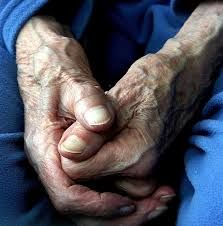Career
Doula for the Dying
A summer spent volunteering for hospice, and lessons learned.
Posted August 29, 2013

A friend described the situation perfectly. “You are pretty much a stranger, walking into a home situation that can be so personal and vulnerable.”
This is what I, as a home hospice volunteer do. And hopefully, in that context of stress and sadness and pain, I can offer some solace through listening and just being a consistent presence.
My personal project this summer was to deepen my understanding of death and dying, and by association, living. As a medical sociologist and social gerontologist, I had taught the courses, but did I really know anything about dying, from reading books and grieving my own losses? And what could one learn about living, through comforting those in the end stages of their lives? This wasn’t a formal research project. This was just me, going deeper.
As the summer comes to a close, I have no idea how to sum up this experience. I have rubbed feet, held hands, recorded memories, and mostly just sat and listened, to everything from changes in breathing, to tearful stories of parents lost, gratitude for a life lived, or frustration for not having answers.
Being a hospice volunteer enables me to work at being present with myself and with others. To value human connection and vulnerability. And, of course, hospice is about life transitions, for all involved. (In many ways, my research on how people cope with retirement as a life transition is not so different from coping with the unknown at the end of life.)
Us volunteers are trained to be present with those who are dying. To become more comfortable with death, we write our own obituaries, and participate in an extended meditation on our own death. We learn how to help a patient transition from couch to chair, how to work an oxygen tank, how to think through ethical dilemmas (like gifting). But the real training is in the doing. Because dying is as complex as living.
The wife of a dying man told me she tried so hard to “lick it” – his terminal disease. That was her training, she said, to work hard and focus on the problem, and you can solve it. But it didn’t, and now she must accept this, and wait for the end.
A dying woman only spoke to me in Romanian, I in English and rudimentary Spanish. I think we managed to connect.
A man slept in a hospital bed, positioned in former dining room of his home. “I will shop and he will sleep the whole time,” his wife said. “He is at the very end stages.” But minutes after the garage door closed, he came alive, reaching for something elusive above his head, mumbling to himself, and then he slept again.
Another hospice patient sat watching the Food Network, munching on spice drops. “This is my only addiction,” she admitted. Later, her husband and caretaker reminisced about their travels, and wondered if he would ever travel again.
My role during the 2-3 hour shift is to sit with folks. But the hospice team involves many, including chaplains who talk to patients of any background, helping them to forgive, to right past wrongs, to let go (one even performed an informal divorce ceremony at a patient’s bedside!); social workers who get to know extended families, life stories, and bucket lists; and nurses and doctors and psychologists trained in grief support, pain management, and comfort care.
An ongoing life lesson for me is accepting the unknown. I feel like I learn this over and over as a parent, and now as a doula for the dying.
My summer project is really a life project. So I will continue doing hospice work, and see where it takes me.


